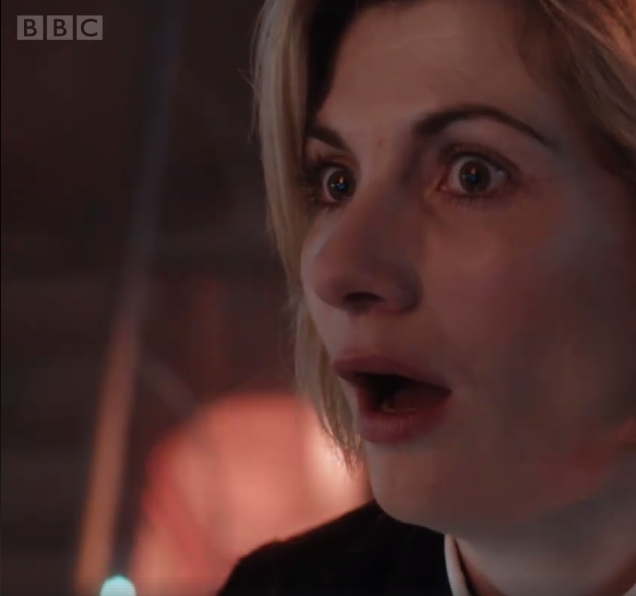Warning: You’ll want to watch the episode first. Spoilers ahead.
I say this with confidence: time will be kind to Steven Moffat.
A small sub-section of ‘fans’ hate the Doctor Who showrunner, for some reason or another (over-exposure, perhaps).
But in the future – in the pages of Doctor Who Magazine, probably – we’ll be saying: “Do you remember the writer who created the Weeping Angels?” “What about that guy who wrote Blink, Empty Child, A Christmas Carol, Time of the Doctor, Heaven Sent, World Enough and Time, Listen, Deep Breath and The Eleventh Hour?” “Let’s never forget the person who cast Matt Smith, Peter Capaldi and John Hurt as The Doctor.” “Or the showrunner that led the brilliant 50th Anniversary celebrations.” “Hey, do you remember when he fired the Doctor into an insane asylum full of deranged Daleks?”
What we probably won’t here, sadly, is: “Do you remember when he ended his reign with a bombastic, silly, wonderful Christmas special that ushered in an entirely new era for the show?”
We won’t hear that. Because that didn’t happen.
Twice Upon A Time was set-up as a typically ambitious ending to Steven Moffat’s era of Doctor Who. The Doctor is refusing to regenerate for some reason, and he runs into his past self, who is also refusing to regenerate for some reason. It stretches a bit of credibility, although I did find the concept appealing. It’s scary to move on and become someone new, it’s something we can all relate to.
Clearly, Moffat felt if he put David Bradley (who has been cast as the first Doctor) and Peter Capaldi in a room together, then he didn’t need to do much else. The interplay between the two was ok, but complicated. On the one hand the first Doctor behaves a bit like 12th’s grandfather; grumpy, confused by his fashion choices, and woefully out-of-touch with the way the world works. Yet, in actual terms, he’s more like a teenage Doctor… either way, the 12th’s obvious embarrassment is entertaining to see.
Yet for more seasoned fans, the first Doctor was never really like this. Sure, the show adhered to racial and gender stereotypes of the age – The Doctor would often send Barbara out for the tea, for example. But he was never a misogynist. I didn’t buy into this extended joke.
There were a few decent moments of humour, but overall, this wasn’t Moffat’s finest comic effort on the show so far.
As for the adventure itself, there was no real adventure. The Doctor meets someone that looks like a Moffat bad guy (complete with blank facial expressions – see Weeping Angels, Snowmen, Whisper Men, gas mask kids, clockwork droids…), but turns out not to be. Our hero even ultimately admits that there was no evil plan after all, and the episode runs out of steam. Our ‘villains’ were extracting people from timelines just as they were about to die, so that they can upload their memories to a database and they can live on. They then return their physical bodies back to the point of death.
A WW1 Pilot was extracted from his timeline, and because The Doctor was moping around about regenerating, he ended up being returned to the wrong place (the exact explanation for this is… timey wimey). The Doctor has to take the WW1 captain back to the point of his death, but saves him by returning him to a few hours later, when the Germans and English celebrated Christmas together during the famous 1914 truce. It was a nice scene, if a little overdone. By this point, we’d gone through so many scenes of people standing around chatting, I was beginning to feel a little bit bored.
I’ve left out the bit where the Doctor goes to see that ‘good’ Dalek from an episode that aired over 4 years ago. But he does that as well.
I obviously anticipated a level of self-indulgence in Moffat’s final episode. After 12 years on the show, 7 as the showrunner, he was saying goodbye. Capaldi was saying goodbye. Pearl Mackie, returning as Bill, was saying goodbye. Mark Gatiss, another long-serving writer who plays the WW1 captain, is saying goodbye. Toby Whithouse, who plays the German soldier and who wrote numerous Doctor Who episodes, was saying goodbye.
This was the long goodbye. And that is fair enough. But it did go on. Capaldi got to deliver one of his trademark speeches at the end, which largely involved him telling his future self to be kind over and over again. And his final line said it all: “Doctor, I let you go”… a line not remotely relevant to the audience (who really isn’t letting anyone go). But only really applicable to the writer and actor.
But then… then… Jodie appeared. “Oh Brilliant,” she says, and I grin at the Yorkshire accent and that smile (after 25 years as a fan, do I suddenly fancy The Doctor?). And then the TARDIS blows up and chucks her out.
After 60 minutes on Christmas Day, of watching old quotes respoken, friends saying goodbye and an adventure that wasn’t really an adventure at all, I am suddenly intrigued and excited again.
And I realise that although time will be kind to Steven Moffat, and he will be seen as one of the great Doctor Who leaders (if not the great), it really was time for him and his team to step aside.
Just 9 months to wait now.
